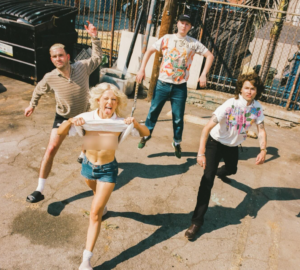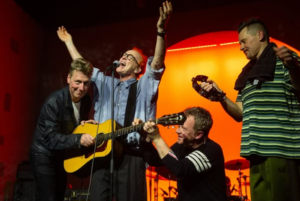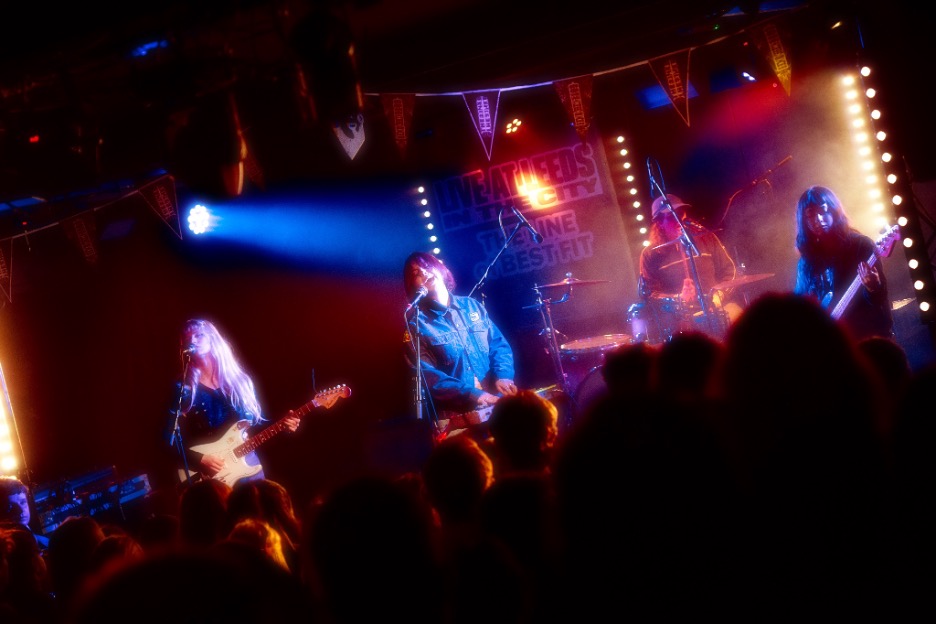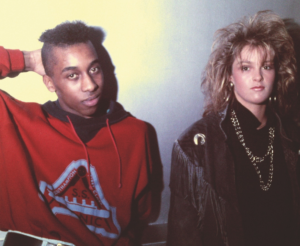The Legacy of Manchester’s Most Iconic Club: Interview with Rebecca Hook
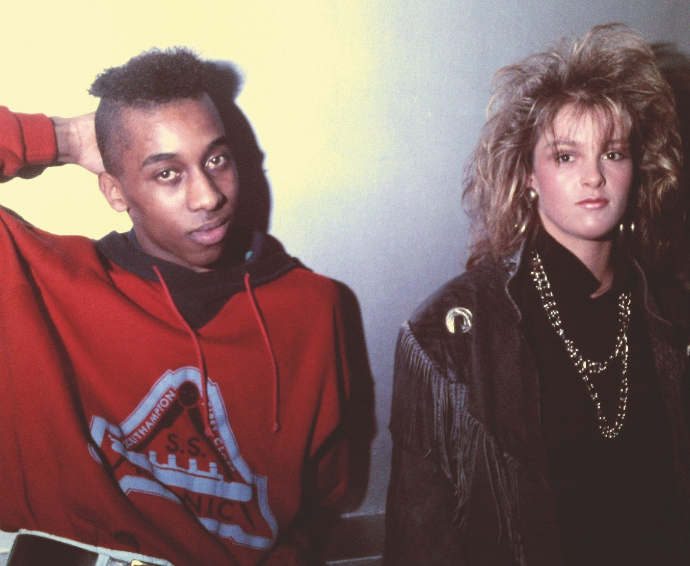
Image Credit: @fac51thehaçiendaofficial
Music and Clubs Editor Millie Cain speaks to Rebecca Hook, author of The Hacienda:Threads, discussing the nights, people, and music that made Manchester’s most iconic club.
Late last year, Hacienda: The Threads was announced to release, perking up ears of every 50-year-old ex-raver in the North, and their daughters. Not just a very well-timed Christmas present but a really genuine, evocative insight into the culture the Hacienda created from the eyes of those who built it, with a foreword by Peter Hook. Remembered for its Acid House revelations, subcultures, and less remembered for its financial struggles and the patron’s rising drug use.
Celebrated with a huge launch party hosted at New Century Hall, with Peter Hook on the decks and also in conversation. Joining him on the panel were Noel Gallagher, Ang Matthews, Angela Murray, David Hoyle, Graeme Park, Greg Wilson, Ian Griffiths, and Paul Cons. Described by Rebecca as “A really good night! It was very well received; I was so grateful for the people that turned up and we didn’t expect that. We thought, you know for a book launch, we expected 500, but I don’t know how many were there, my daughters told me 900 people which was incredible. It was fun as well, perhaps these people have known each other for years, so it was just like a load of friends sitting around the kitchen table having a moment really.”
The event supported 3 incredible charities that are close to Rebecca and her family’s hearts, as well as the wider Hacienda community. Mind, Sacoma UK, and the Albert Kennedy Trust all do incredible work with mental health, cancer support, and LGBTQ+ people who are doing amazing work for the homeless. More information for each charity is available at the bottom of the page, and Rebecca mentioned how they highlighted the work they do and helped out as much as they could, please take the time to read at the end.
For myself, my thoughts on the Hacienda are solely shaped around my parents’ experiences that they passed down to me, and Rebecca shared her own memories. “It’s, it’s funny because all, everybody’s got different memories of of the club. Everybody went to different nights. So, it’s actually interesting that the stories in the book were taken fromdifferent experiences and different viewpoints.”
“I like the fact that Andrew O’Hagan and Irvine Welsh did a piece because they’re great friends together. And they went on to write some really interesting books about clubbing and the friendships that people gain from clubbing. And I think with that has to actually be the reason that they they stick out to me is that there were different people that, that we interviewed, obviously are synonymous with the club. And it was nice to hear of other people that are creatives about their experiences.”
“Some were actually quite touching. There were so many places before The Haç where everyone clubbing. So actually, for people to say, The Haç was the only place that they actually felt safe, I thought that was really, really lovely. I mean,the thing that resonates with me most about The Haç was it was label free, I think. Now, everybody, I think everybody feels they need labelling which I agree is important. But, you know, with those labels we had, there was a bit of a label freedom in The Haç. So, it didn’t really matter. People gay, straight, black, white, where you came from, everybody just got on with it and just had a great time. You’re all there the same reason to have a fantastic night and to meet your friends. And I think, I think that was such an important part about The Haç but it doesn’t get that mention, everybody’s so busy talking about the nuttiness and all the madness that went on, which not disputing that it did go on. But people went there for for the right reasons.”
Rave Culture itself has certainly changed though in the years since the Haçienda closed in June 1997, with obviously social media playing a huge role in that. “I personally i think through social media we all kid ourselves, me included. I sit my pjs at 9 at night and think that I’m actually catching up with friends through Instagram or Facebook or on the end of the phone. And I think what we’re all lacking is physical contact. On the night of the book launch, the first thing we did was come up to each other and give each other a hug. That doesn’t happen anymore. Don’t get me wrong, you know, life is so international so you can be, you can be living in Spain or America, and you can catch up with somebody. But, you know, with your general friendships, I think it’s such a shame that we don’t spend more time physically with each other. You know, we all shop online. In the old days, on a Saturday afternoon, Manchester was massive, people getting excited about getting dressed up for the weekend, and that was the beginning of your weekend. You catch up with people, you know, go out for a drink and go to your favourite shops, be it Top Shop, or high-end Vivian Westwood, or all these different places inside Afflecks Palace. But that in itself was a social activity, it was all part and parcel of the night, really. What do you think friendship wise is now? You know, the friends that I made clubbing are still my closest friends, 30 years on. They are, and they come from all different walks of life. The people that I probably wouldn’t have met stay level. They’re of all ages and they’re all, you know, from different backgrounds. I wouldn’t have met those people had I not been out clubbing. What about you? How do you feel about it now?”
Rebecca span the conversation on myself here, with a genuine interest in how clubbing negates our friendships as young people, in a completely different environment. I mentioned my housemates, my best friends, the people I met through university and those I lost connections with through a lack of contact. Andrew O’Hagan’s own book, Mayflies, was one that really resonated with me last year, and the way he intimately described friendships and the people you love really stood out. My friends and I do have a habit of going out and keeping to ourselves, staying in our own group, and there can be a really distinct lack of chatter, especially on University Club Nights. And for clubs outside of these, there can be a real weight to them sometimes an intensity that isn’t always the most comfortable.
“I agree with you i think that that there is a heaviness about clubbing now that they never used to be. There’s there’s a lot more oh god be it spiking and there’s just not that freedom that I feel I had when I used to go clubbing. I used to spend a lot of time in the Gay Village because it felt so safe, and it was really free. And I love the fact that we could dress up and feel however we wanted, and it was just fun. It was like peace of mind. Sometimes we just have such a lovely time, and I suppose, going to other places now, the big warehouses and stuff like that, it is I feel, a totally different atmosphere. At The Haç we’d do the big nights, they’d sell out, everybody seemed to love them, and they seem to be relatively trouble free which I’m delighted about. But lots of people that went to the house in the in the beginning, actually come to the events now with their kids. And I think that’s actually really nice. I think probably the parents are more misbehaved than the kids.” Agreed Rebecca, from experience. Hi dad if you’re reading this!
“I’m a fan of a smaller venue. That’s my bag. I just love a smaller venue. But that’s just me. I’ve always been the same. I’d like to say it’s just an age thing, but it isn’t an age thing for me personally. Some people love going into these mad, big places. How do you think we should change it? Because, you know, at the end of the day, you guys are the people that we need to please.” From going out in Manchester as a teenager, to now being over in Leeds, I think we could all agree that smaller rave venues like Eiger Studios or White Hotel have a shine that The Warehouse Project wouldn’t begin to find. Majorly because they’re catering to a hugely different capacity, but there’s an intimacy in the smaller venues that I think we as a generation are still drawn to.
“Well, watch this space chicken. I really will get these events going. We need to listen to you guys, because, at the end of the day, you’re only as good as your audience. Because, to start with, we had high hopes of doing all sorts of things for the launch. We were gonna do a fashion show. But then the only problem with that was because in the old days, everybody used to be up on the podiums on the stage. Everybody used to be dancing everywhere. And I wanted to recreate that feel with the podium, with the the catwalk. Now, because of health and safety, unfortunately, you’re not allowed to, and you have to have barriers. I just thought that’s gonna totally take away the feel of what we wanted, I mean we were lucky on the launch night that we didn’t have to have anything around the panel table.”
“It was really important for me that everybody felt included but then you have to realise that you’re only as good as your audience. Everybody was so lovely, nobody trying to be big or clever. It was just a really, really lovely night. People coming up from everywhere asking questions, and everybody was just there to have a nice time. And that’s what you really need.”
With Ian Griffiths on the panel of the launch, and in the book, the once punk, now creative director of Max Mara brought in the huge aspect of fashion for The Haçienda, and Manchester’s culture.
“That’s actually what I was wanting to do the book about, because, as I say, fashion was such a massive part of Manchester’s heritage, really, some really great designers came out of Manchester. If you think the first meat dress was made by a girl called Alison Night. She actually made the meat dress downstairs in the, in the basement of The Haç before a club night. And Linda Sterling is a very famous artist, and she was a performer and wore this dress. And I actually said, what did you make it out of? And they’ve been in Chinatown, and they made this dress up with chicken feet, so it was like a tutu. And you just think, my God, it must smell. But afterwards, that’s why Lady Gaga did the meat dress she’d actually referred to it years later as as the dress that had been born in The Haç. She had it made, but obviously in a different way.”
“But people like Ian Griffiths, he was a student in Manchester, and he decided that he wasn’t that good. So, he was gonna leave, fashion, but a guy called Kevin Cummins, the photographer came up to him one night and he had one of his creations on. Kevin said, ‘ I love this, look can I photograph you?’ So, when Ian got the photographs from Ian he thought, you know what? I can do this. I’m gonna carry on. And thank God he did so. And he was only 17 at the time. So, if you think that he was 17, Kevin was the same age too, all these different people, all of them were students when they started out at The Haç. The thing about they were kids. They were young. There were students. So, it’s sort of it, there’s nothing better than somebody that you care about, someone that inspires you going ‘you can do this’. And I think that’s the thing. Again, through contact. You can’t do that over Instagram. So, we carried on.
“People, even like Paul Smith refer to The Haç as inspiration. Matthew Williamson, Henry Holland, John Richmond, all these people. It used to be that anything went at the time, you could walk in with next to nothing. It was a massive place, and everybody was, was happy to get dressed up, and now I think sometimes people seem to wanna just melt into the background? I think a lot of the time you’re going out in clothing and you’re just like trying to just dress like what everyone else is dressed as. I feel like people just judge so harshly and can be quite personal about it. Especially with people being so label-oriented with brands. But it’s cool to see their spaces starting to appear, where you can dress a bit more freely.”
“But in the beginning, it was quite funny because I never went out with a handbag ever, so i used to have my best friend Dan as my handbag. So, he used to have my eye drops, my lipstick and that was it. And now, obviously you get designer handbags and you designer trainers and all those types of things. It was never, ever important in those days. The Exchange used to have 49 different designers underneath it. So, at the weekend, it used to be mad. Everybody comes to get the club in gear. It was a really, really important part of town, if not the most important part town. And, and I think that’s what’s missing in Manchester.”
For the future of The Haçienda’s legacy, Rebecca described their club night ambitions “to bring back the new, the heart, the flash, all these different nights and see how they work, and see if you guys wanna come, really. Flash nights well they were gay night, but they were wild. They were very dressed up. It was just mental and there were all sorts of wild things going on. Paul Kong was in charge, and some of his ideas were wild. But again, it was just so free and just so evocative. It was a night of of madness, always on a Wednesday. And we wanted to get a late license but if you going to the village then you probably would have loved it.”
Leaving our conversation on a promising “watch this space, darling” was a true pleasure, there’s hope for the future of The Haçienda, and that hope is for us.
The Haçienda: Threads is available online and in bookstores now, a brilliant read with excellent photography, anecdotes & a foreword by Peter Hook.
Mind is a UK Charity fighting for mental health. For support, respect, and for you. For information and advice to help yourself or someone else, visit https://www.mind.org.uk
Sarcoma UK is a national charity that funds vital research and offers information and support to anyone affected by sarcoma https://sarcoma.org.uk
Albert Kennedy Trust (AKT) helps LGBTQ+ people aged 16-25 find safety, security and new pathways to fulfilment who are experiencing or at risk of homelessness https://www.akt.org.uk
Words by Millie Cain, in conversation with Rebecca Hook.

